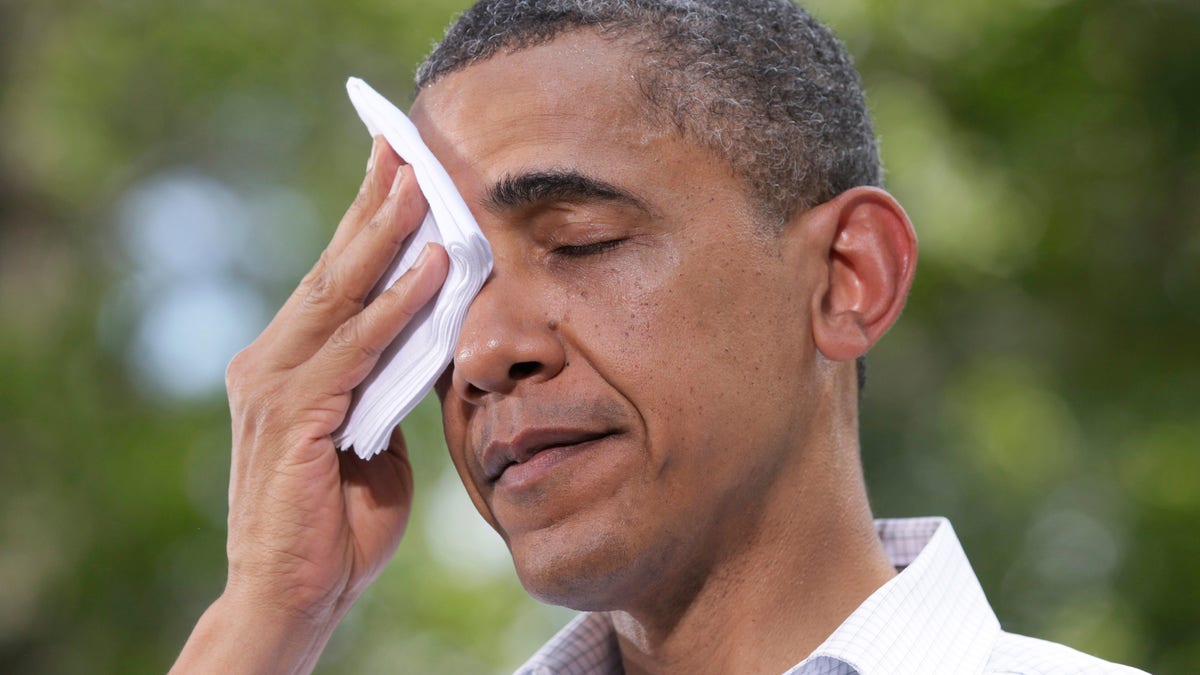
President Obama wipes his brow as he speaks during a town hall meeting at Lower Hannah's Bend Park in Cannon Falls, Minn., Monday, Aug. 15, 2011. (AP2011)
The Obama administration now faces a key legal and political dilemma -- what to do about the recent decision from a federal appeals court that said the new law's mandate that every uninsured American must buy health insurance is unconstitutional.
Many political analysts think the White House will try to delay Supreme Court consideration as long as possible.
"They definitely don't want to see it go to the Supreme Court until after the elections,” said Kirsten Powers, a former Democratic operative and a Fox News analyst. “So my expectation is they would do whatever they can to slow walk this so that this does not get to the Supreme Court where possibly the individual mandate could be struck down which would be very damaging for the administration."
There is no doubt the health care law is headed for the Supreme Court -- the only question is when. The recent decision by a panel of judges from the 11th Circuit Court of Appeals in Atlanta is only the broadest challenge to the law, brought by 26 states and the nation’s largest association of small business owners. But there are multiple, conflicting appellate court rulings and huge stakes for the case.
"This is the most important constitutional cases of the decade, " said Greg Katsas, one of many lawyers challenging the new law. "You have two conflicting opinions, and you have one Court of Appeals striking down a federal statute. Either of those makes the case appropriate for Supreme Court review."
The 11th Circuit only invalidated the individual mandate, arguing Congress did not have the power to force people to buy insurance or any other product. As far as the rest of the health care law is concerned, its ruling only said Congress did have the power to create the other provisions.
But would they work without the individual mandate? Neither the president nor the critics think it would and that's one reason the administration may want to avoid an early Supreme Court decision.
"Regardless of whether the courts ultimately strike down the entire law, if they strike down the individual mandate as unconstitutional, the reform doesn't hang together and ultimately Congress will have to rework it in its entirety," said former Congressional Budget Office Director Doug Holtz-Eakin.
The president seems to agree, arguing on the campaign trail in Minnesota this week that the new law could not work without the individual mandate.
"If an insurance company has to take you, has to insure you, even if you're sick," the president explained, "but you don't have an individual mandate, then what would everybody do? They would wait until they get sick, and then you'd buy health insurance, right?"
"You can't not have health insurance," the president continued, "then go to the emergency room, and each of us, who've done the responsible thing and have health insurance, suddenly we now have to pay the premiums for you. That's not fair."
So one might think the president has some interest in getting a quick decision from the Supreme Court.
But most analysts believe the White House will try to delay a decision as long as it can-- first, by asking the full appeals court to rehear the case, which could postpone a final decision there for months. Then, the administration could take the maximum time to request Supreme Court consideration, hoping to push a final decision past the 2012 election.
"It's not a politically-winning issue for them," Powers said. "All anybody cares about right now are jobs and economic growth and they don’t want to be reminded about health care."
So the administration's strategy may be to postpone final judgment until after the election, and save the president potential embarrassment, but one of the lawyers challenging the law says the country deserves to know sooner rather than later.
"People have to invest millions if not billions of dollars in revamping the Medicaid program, re-designing health insurance programs, saving for the mandate,” said Katsas said. “All of those sorts of decisions have to be made now by people who need to know what the rules are."
So an early decision would prevent money from being squandered if the law were eventually struck down after all that spending. And that is a judgment the president may be reluctant to face while running for reelection.
"That would be a major blow in the middle of a campaign season where they would have to then ... re-litigate the whole healthcare debate in a way that they just don’t want to," Powers said.












































